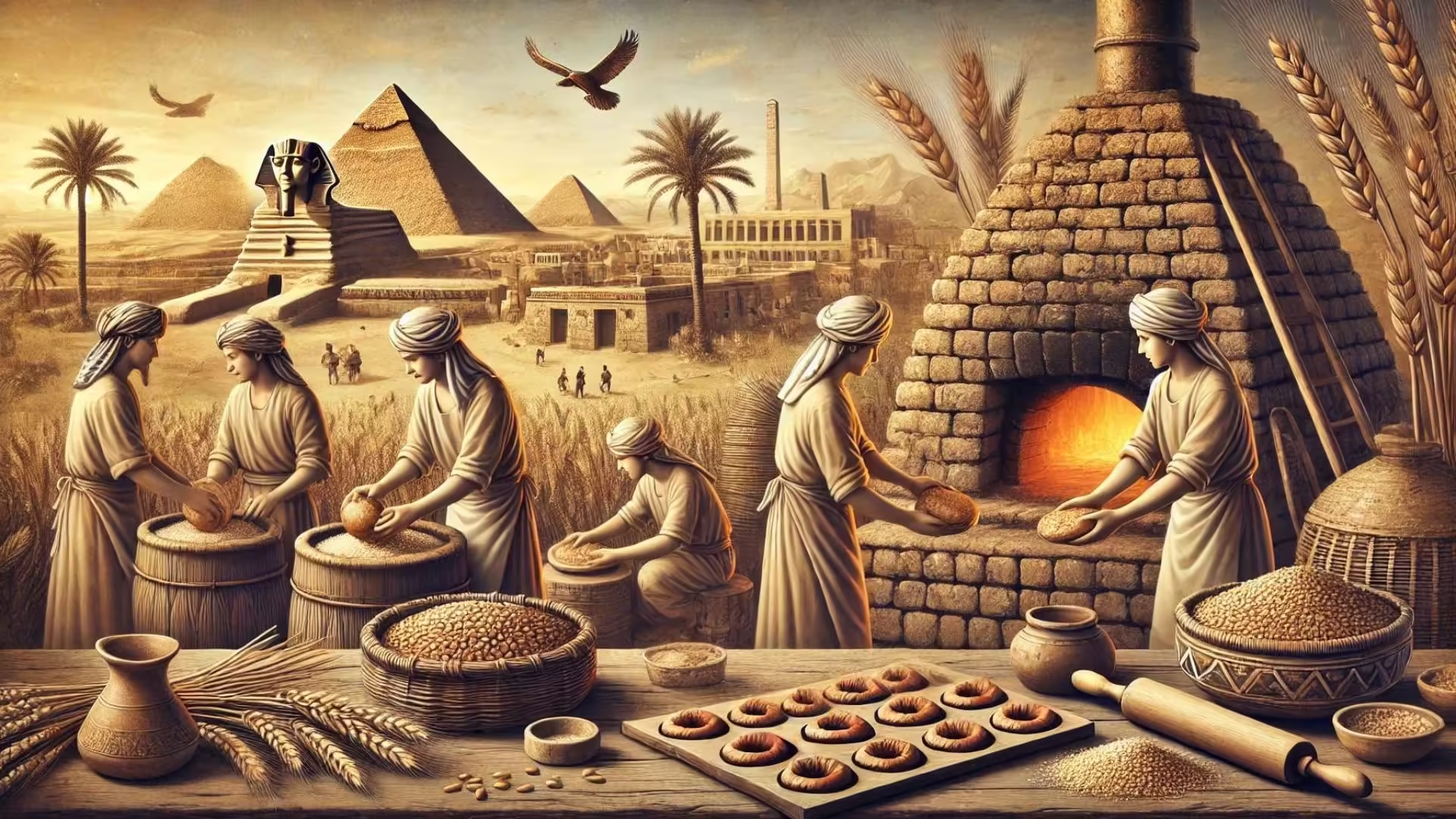Egypt: The Ancient Practice of Bread-Making
Bread has always been a staple of life, a symbol of sustenance, and in ancient Egypt, it was so much more. From the pharaohs to the farmers, bread was a crucial element of Egyptian culture, woven into the fabric of daily life, rituals, and religion. But this was no ordinary bread—Egyptians were pioneers in the art of baking, and their methods have influenced bread-making for millennia.
The ancient practice of bread-making in Egypt reveals much about the civilization’s ingenuity, communal spirit, and connection to the land. By understanding this cultural legacy, we can gain deeper insights into how food shapes identity and community—lessons that are just as relevant today.
Bread as the Foundation of Egyptian Life
Bread wasn’t just a meal in ancient Egypt; it was a symbol of life itself. Egyptians referred to bread as ta, which also meant life. This dual meaning highlights the vital role bread played in sustaining the population. From workers building the pyramids to priests conducting sacred rituals, bread was present in every aspect of society.
For the Egyptians, bread-making began with the cultivation of wheat and barley along the fertile banks of the Nile River. The annual flooding of the Nile replenished the soil, making it ideal for growing crops. The relationship between the river and the land was central to Egyptian life, and bread was a direct product of this natural cycle.
Imagine the connection between the people and the land—every loaf of bread was a testament to the fertile soil, hard work, and community cooperation required to harvest, grind, and bake the grain. Today, bread remains a powerful symbol of sustenance in many cultures, reminding us that food is about more than nutrition; it’s about connection, tradition, and heritage.
The Process of Bread-Making in Ancient Egypt
Bread-making in ancient Egypt was both an art and a necessity. The process began with grinding grain into flour using stone mills. This was labor-intensive work, often done by women in households or larger communal settings. The resulting flour was mixed with water, sometimes fermented using wild yeasts, and kneaded into dough.
What’s fascinating is that the Egyptians are credited with being among the first civilizations to experiment with leavening—using yeast to make bread rise. This was a revolutionary development in baking, transforming flat, dense breads into lighter, more textured loaves. Archaeologists have even discovered ancient Egyptian loaves that were surprisingly similar in shape and form to modern bread.
One unique element of ancient Egyptian bread-making was the use of various baking molds and ovens, which allowed for a wide variety of shapes and sizes. Bread was often baked in conical molds placed over an open flame, resulting in a crusty exterior and a soft, chewy interior.
The attention to detail in bread-making wasn’t just about taste; it was also about creating a connection between food and faith. Bread offerings were commonly made to the gods in temples, and loaves were placed in tombs to provide sustenance for the afterlife.
Bread’s Role in Egyptian Society and Religion
Bread was far more than a daily meal in Egypt—it had deep religious and social significance. Egyptians believed that bread had spiritual properties and was essential in maintaining balance and harmony with the gods. In religious rituals, bread was offered to the deities as a symbol of gratitude for the bounty of the Nile.
Moreover, bread was central to Egyptian social structure. It was used as currency, a form of trade, and even as payment for workers. For instance, the builders of the pyramids were compensated with loaves of bread and beer. This combination of food and drink was seen as a worker’s sustenance, and it reinforced the idea that bread was both sustenance and a symbol of human labor.
In today’s world, we may not offer bread to deities, but bread continues to carry symbolic meaning. Whether it’s breaking bread with family during a meal or using bread in religious rituals, the practice connects us to the past, reinforcing bonds of community and culture.
What Ancient Egyptian Bread-Making Teaches Us Today
The ancient practice of bread-making in Egypt reminds us of the importance of food in shaping culture, community, and identity. Bread was a unifier—a shared experience that connected people to the land, to their labor, and to each other.
In modern life, we are often disconnected from the process of food production. Bread comes prepackaged from the store, and few of us think about the history, the hands, or the land that brought it to our tables. Yet, by reflecting on ancient practices like those of the Egyptians, we can regain a sense of appreciation for the art of food-making and the communal effort it requires.
Consider making bread at home. It’s a simple act, but it can reconnect you with a practice that’s thousands of years old. Kneading dough, waiting for it to rise, and then sharing it with loved ones is a timeless way to honor the human connection to food.
What You Can Do
The next time you enjoy a loaf of bread, take a moment to think about its journey—from the grains grown in the soil to the hands that transformed it into sustenance. You might even try making your own bread at home, as a way to connect with this ancient practice.
Appreciate the cultural significance of food in your life. Whether it’s sharing a meal with family or learning about food traditions from other cultures, use these experiences to deepen your connection to the world around you. Bread, after all, is not just food; it’s history, culture, and community in every bite.
Bread was central to life in ancient Egypt, and it remains a powerful symbol of sustenance and connection today. How will you honor this timeless tradition, and how can it inspire a deeper understanding of food, culture, and community in your own life?
Expand Your Vocabulary
- Sustenance
- Meaning: Something that provides nourishment or support for life.
- Everyday Use: Bread was a form of sustenance in ancient Egypt, just as a balanced diet provides us with the sustenance we need to function in daily life.
- Leavening
- Meaning: The process of using yeast or another agent to make dough rise and become lighter.
- Everyday Use: Many baked goods, like bread and cakes, use leavening agents such as yeast or baking powder to create a fluffy texture.
- Cultural Legacy
- Meaning: Traditions, practices, or achievements passed down through generations within a culture.
- Everyday Use: The cultural legacy of ancient Egypt lives on through their art, architecture, and practices like bread-making, which still influence us today.
- Nourishment
- Meaning: Food or sustenance that helps with growth, health, and maintenance of life.
- Everyday Use: A home-cooked meal provides both physical nourishment and emotional comfort, just as bread nourished the bodies and spirits of the ancient Egyptians.
- Fluctuating Markets
- Meaning: Changing or unstable financial markets, where prices or availability of goods shift unpredictably.
- Everyday Use: Farmers and producers often have to adjust to fluctuating markets when deciding when and how to sell their crops or products.
- Fermented
- Meaning: A chemical process where yeast or bacteria converts sugars into alcohol or acids, often used in baking and brewing.
- Everyday Use: Fermented foods like yogurt, kimchi, and sourdough bread offer unique flavors and health benefits through this natural process.
- Conical Molds
- Meaning: Cone-shaped tools used to shape bread or other foods.
- Everyday Use: While not common in modern baking, conical molds were a staple in ancient Egypt, giving their bread a distinct shape and texture.
- Offering
- Meaning: A gift or contribution, especially in a religious context, to show gratitude or seek favor.
- Everyday Use: People often make offerings in religious ceremonies, such as lighting candles or giving food to others as a symbolic act of generosity.
- Symbolism
- Meaning: The use of symbols to represent ideas or qualities beyond the literal meaning.
- Everyday Use: In ancient Egypt, bread was a symbol of life and sustenance, just as a handshake can symbolize agreement or friendship in everyday life.
- Communal
- Meaning: Shared by all members of a community; for the common use or benefit of a group.
- Everyday Use: Communal activities, like community gardens or group meals, foster a sense of connection and shared purpose among participants, similar to how bread-making brought ancient Egyptians together.
Let’s Talk
- Bread was both a daily meal and a symbol of life in ancient Egypt. How does food in your own life connect to traditions, culture, or community? Are there certain meals or foods that hold special meaning for you or your family?
- The Egyptians made bread offerings to their gods, showing the spiritual importance of food. In what ways do you view food as more than just nourishment? How can preparing and sharing meals create deeper connections with others?
- The practice of bread-making required patience and skill, from growing crops to baking the final loaf. What skills or activities in your life teach you patience and bring a sense of fulfillment?
- Bread was often shared communally, reinforcing bonds within society. How can modern-day practices, like family meals or community food initiatives, strengthen our connections with others?
- Ancient Egyptian bread-making was a direct reflection of their connection to the land. How can we, in modern times, reconnect with the sources of our food and appreciate the process that brings it to our tables?
Reflect on these questions and consider how the ancient practice of bread-making mirrors your own experiences with food, tradition, and community. Share your thoughts with friends, family, or in the comments to inspire a meaningful discussion about the role food plays in shaping our cultures and lives.











0 Comments